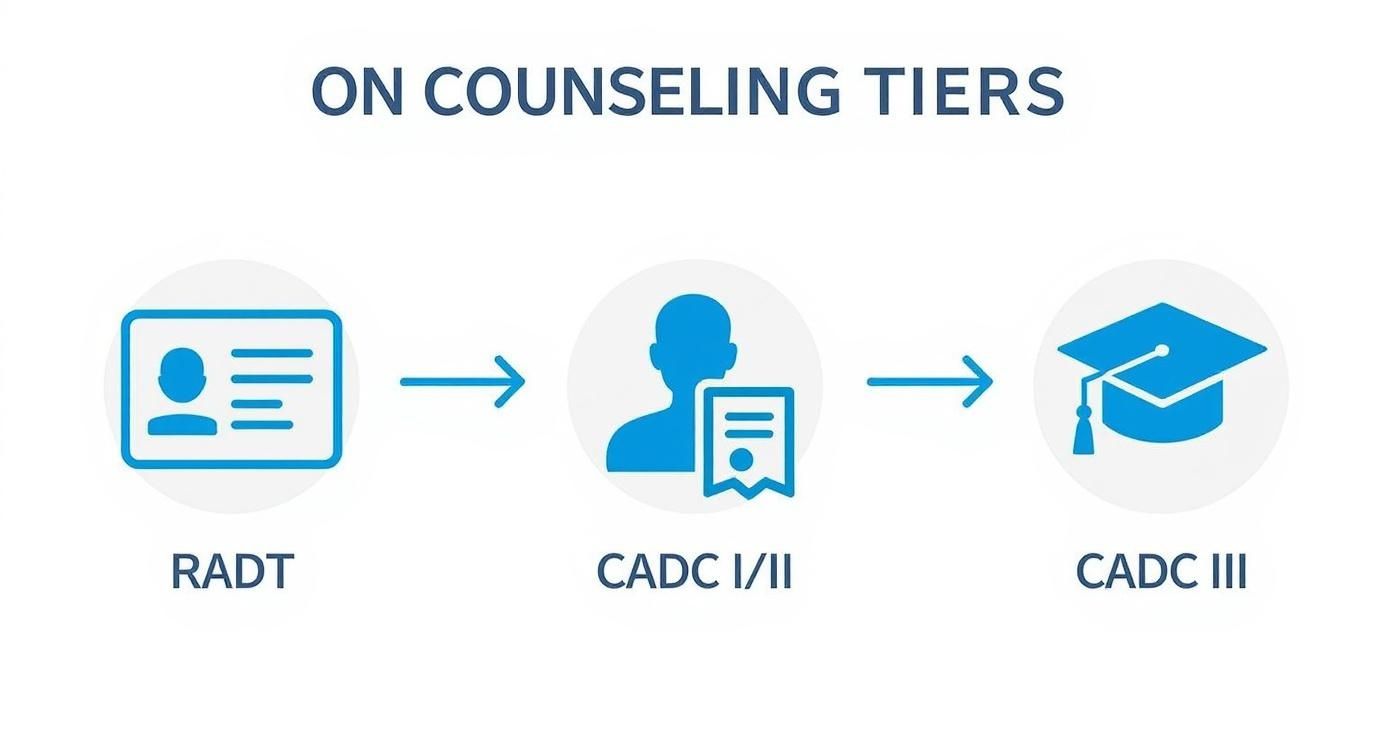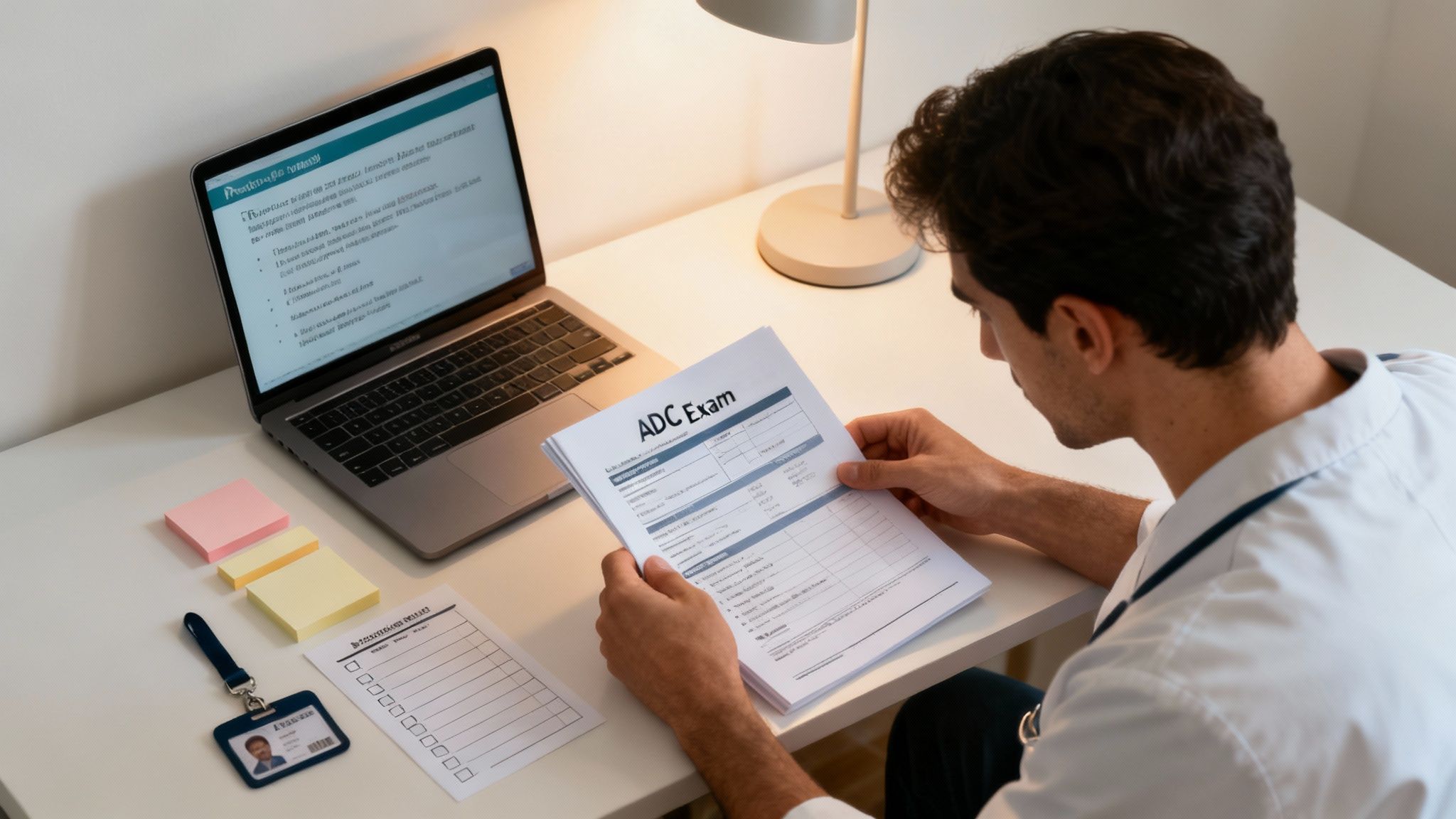
Your Guide to Substance Abuse Counseling Certification
Earning your substance abuse counseling certification is more than just a piece of paper—it’s the gold standard that proves you have the skills and dedication to guide people through recovery. This isn’t just about coursework; it’s a rigorous process involving specialized education, thousands of hours of supervised clinical work, and a comprehensive exam that shows you’re ready for the responsibility.
Making Sense of Counseling Certifications and Acronyms
The first thing you’ll notice when you step into this field is the alphabet soup of credentials. It can feel a bit overwhelming, but there’s a method to the madness. These acronyms represent a structured system, with different tiers that correspond to your level of education, experience, and competence.
Figuring out this landscape early on is crucial. It’s not just about memorizing what CADC or CASAC stands for; it’s about making a strategic choice that will steer your career path. The credential you choose will define what you can do, where you can work, and how far you can advance. Before you even think about applications, it’s worth getting a deeper understanding of drug and alcohol addiction to build a strong foundation for the journey ahead.
Common Certification Tiers and What They Really Mean
You’re going to see acronyms like CADC and ICADC everywhere. They look similar, but the differences in their requirements and where they’re recognized are significant. Let’s unpack the most common ones you’ll encounter.
-
CADC (Certified Alcohol and Drug Counselor): This is one of the most well-known credentials in the U.S. It’s usually managed at the state level and often comes in tiers, like CADC-I, CADC-II, and CADC-III. An entry-level CADC-I might only require a high school diploma and some initial training, whereas a CADC-III will almost certainly require a master’s degree and a significant number of supervised hours.
-
ICADC (Internationally Certified Alcohol & Drug Counselor): This one comes from the International Certification & Reciprocity Consortium (IC&RC). The biggest perk of an ICADC is reciprocity. It means your hard-earned credential can travel with you to other states or even countries that are part of the IC&RC network. If you think you might relocate in the future, this is a huge advantage.
Key Takeaway: The biggest practical difference often comes down to mobility. An IC&RC-backed credential lets you move around, while a state-specific one is perfectly tailored to local rules but might be a headache to transfer.
The Gatekeepers: Understanding Certification Boards
Certification isn’t handed out by one big national organization. Instead, independent boards—usually operating at the state level—are the ones who set the standards and issue the credentials. Think of them as the gatekeepers of the profession. Your first big decision is figuring out which board to work with.
These boards are essential for maintaining professional quality and consistency. To give you a real-world example, California has three different certification bodies. That shows you just how localized this process can be. One of them, the California Consortium of Addiction Programs and Professionals (CCAPP), is an IC&RC member and offers a clear pathway. You can start as a Registered Alcohol Drug Technician (RADT) and work your way up to a CADC-III, with each step demanding more education and hands-on experience. This system ensures counselors are truly prepared for the challenges of the job. You can find more details on California’s certification bodies and their requirements.
Common Counseling Certifications at a Glance
To help you get a clearer picture, this table breaks down some of the most common certifications. It outlines their scope, who typically governs them, and where they’re recognized, so you can start thinking about which one aligns with your career goals.
| Credential (Acronym) | Full Name | Governing Body Example | Typical Recognition |
|---|---|---|---|
| CADC | Certified Alcohol and Drug Counselor | State-specific boards (e.g., CCAPP in California) | Primarily recognized within the issuing state |
| ICADC | Internationally Certified Alcohol & Drug Counselor | IC&RC Member Boards | Recognized across many states and countries |
| CASAC | Credentialed Alcoholism and Substance Abuse Counselor | State-specific boards (e.g., OASAS in New York) | Specific to certain states like New York |
| CSAC | Certified Substance Abuse Counselor | State-specific boards | Varies by state; common in Virginia, Hawaii |
Ultimately, choosing the right certification is about mapping out your future. Do you plan to stay in one state, or do you want the flexibility to move? Answering that question is the first step in finding the credential that’s right for you.
Mapping Your Educational and Training Path
Think of your journey toward substance abuse counseling certification as building a house. It all starts with a solid foundation—your education. The path you take isn’t a single, straight road; it’s a series of choices that will shape your entire career, from the clients you’re qualified to help to the credentials you can earn.
The requirements can seem a bit complicated at first because they’re tiered. For an entry-level position, a high school diploma plus some specific training might be all you need. But for the more advanced certifications, you’ll be looking at graduate-level degrees. This setup is actually great because it creates multiple entry points into the field, making it accessible while ensuring that higher levels of responsibility come with deeper academic training.
Choosing Your Academic Program
Picking a degree program is one of the biggest decisions you’ll make on this journey. A specialized degree in addiction studies seems like the obvious choice, but don’t overlook other fields. A degree in social work or psychology, for example, gives you a much broader clinical foundation, which can be a huge asset in different treatment settings.
The key is to align your coursework with where you see yourself down the line. If you want to work with teenagers, look for programs with classes in developmental psychology or family systems theory. If you’re more interested in policy or community health, a public health focus might be a better fit. I learned early on that tailoring my education to my specific passion—adolescent recovery—made my subsequent training and job search far more focused and effective.
This infographic breaks down how different educational levels often line up with certification tiers.

As you can see, there’s a clear progression. It starts with entry-level registrations and moves up to advanced, degree-required credentials. Your education is truly the ladder you’ll use to climb in this field.
Core Curriculum You Can Expect
No matter which degree you choose, most programs that lead to a substance abuse counseling certification will have you take a core set of classes. These aren’t just requirements to check off a list; they’re the knowledge pillars you’ll build your entire career on.
You can pretty much guarantee you’ll be diving into:
- Counseling Theories and Techniques: This is where you’ll learn the fundamentals of different therapeutic models, like Cognitive Behavioral Therapy (CBT) and Motivational Interviewing.
- Ethics and Professional Conduct: You’ll get to know the legal and ethical rules of the road—things like confidentiality, professional boundaries, and mandatory reporting.
- Pharmacology of Substance Abuse: This covers the science of how different substances affect the brain and body, including withdrawal symptoms and medications used in treatment.
- Assessment and Treatment Planning: Here, you’ll develop the crucial skills to properly assess clients, diagnose substance use disorders, and create personalized recovery plans.
A strong grasp of these core subjects is non-negotiable. They provide the evidence-based framework you’ll rely on every single day to make sound clinical judgments and truly help your clients.
State-Specific Educational Pathways
It’s absolutely critical to understand that the path to certification can look very different from one state to another. While the Certified Alcohol Drug Counselor (CADC) is a widely recognized credential, each state writes its own rulebook.
For instance, states like California and Oregon might let you qualify for an entry-level CADC-I with just an associate degree or even a high school diploma and some training. But moving up to a CADC-II or CADC-III almost always requires a bachelor’s or master’s degree in a field like psychology, social work, or behavioral sciences. This tiered system is designed for career progression, but it means you have to plan carefully based on your state’s specific regulations.
This variability also touches on course content and even how you’re taught to care for yourself as a professional. This work can be emotionally demanding, and many programs now emphasize self-care. Building a practice of using tools like mental health journal prompts for self-discovery can be invaluable for your own resilience and well-being. The first step is always to research your state board’s specific requirements to make sure your educational plan lines up perfectly with their criteria.
Securing Your Supervised Clinical Hours

If your coursework is the skeleton of your expertise, then your supervised clinical hours are the muscle that brings it to life. This is where theory hits the pavement. It’s arguably the most important—and demanding—part of your journey to becoming a certified substance abuse counselor.
This isn’t just an internship; it’s a mandatory training period where you work directly with clients under the watchful eye of a qualified supervisor. The time commitment is significant and varies a ton by state and credential, but you can generally expect to log anywhere from 2,000 to over 4,000 hours.
What Actually Counts Toward Your Hours
Heads up: not every minute you spend at your placement will count. Certification boards have very specific definitions of what constitutes “clinical experience,” so you need to know the difference between qualifying tasks and general office work.
So, what kind of work actually moves the needle? Usually, it breaks down into these core areas:
- Direct Client Work: This is the heart of it all. We’re talking about one-on-one counseling, leading group therapy sessions, and handling initial client assessments or intakes.
- Case Management: This involves the behind-the-scenes work of building treatment plans, coordinating with other healthcare providers, making referrals, and meticulously documenting a client’s journey.
- Clinical Documentation: Learning to write clear, concise progress notes, intake summaries, and discharge plans is a critical skill, and the time you spend doing it almost always counts.
- Supervision Meetings: The time you spend with your supervisor, whether one-on-one or in a group setting, is also logged. This is where you process your experiences and grow.
Think of these hours as your training ground. It’s a structured, safe space to test-drive therapeutic techniques and sharpen your professional judgment before you’re flying solo. Having a solid grasp of the science of recovery can make this experience even richer; digging into an in-depth guide to the alcohol recovery timeline will give you a clinical framework to better understand what your clients are going through.
Finding the Right Internship and a Great Supervisor
Now for the big task: landing a quality placement. Start by tapping into your network—talk to professors, program alumni, and any counselors you know in the area. Your school’s career services department probably has a list of local treatment centers, hospitals, and clinics they partner with.
As you look at potential sites, aim for a place that will give you a wide range of experience. A facility where you only observe group sessions is far less valuable than one that lets you co-facilitate, conduct your own intakes, and eventually manage a small caseload.
Expert Tip: Don’t just find a supervisor—interview them. Ask them about their supervision style, their therapeutic philosophy, and how they deliver feedback. A supervisor who is both supportive and challenging is one of the greatest assets you’ll have.
The right supervisor is more than just someone who signs off on your hours. They’re your mentor. They’re your guide. They will push you to question your assumptions, help you work through thorny ethical issues, and play a massive role in shaping your professional identity.
The Art of Keeping Flawless Records
Take it from someone who’s been there: meticulous, consistent documentation is non-negotiable. Every certification board demands a detailed log of your hours, usually broken down by clinical activity and signed off by your supervisor. If you lose that log or fill it out wrong, you could set your certification back by months.
Here’s how to stay on top of it without losing your mind:
- Go Digital: Create a simple spreadsheet with columns for the date, activity, hours spent, and a short note. The key is to update it at the end of every single day while it’s fresh.
- Know the Official Form: From day one, get a copy of the official hour-verification form from your state board. Make your personal spreadsheet match its categories perfectly. This makes transferring the information later a breeze.
- Get Signatures Often: Don’t wait until your last day to get your log signed. Have your supervisor review and sign it weekly or bi-weekly. This prevents any surprises or disagreements down the road.
Trust me, this diligence pays dividends. When you’re finally ready to submit your application, having a clean, organized, and fully verified record of your hours will make the whole process incredibly smooth.
Passing the Exam and Finalizing Your Application

You’ve put in the hours—hundreds in the classroom and thousands more in supervised practice. Now, you’re on the home stretch. The only things standing between you and that hard-earned credential are the certification exam and your final application packet. This stage is all about precision and detail.
Think of this as a two-part finale. First, you’ll need to shift from the hands-on work with clients to a more academic mindset to prep for the exam. Then, you’ll switch gears again, channeling your inner administrator to pull together a flawless application.
Dominating Your Certification Exam
The idea of a big, standardized test can feel daunting, but it’s really just a way to formally confirm all the knowledge you’ve already gained. Most state boards use exams from the International Certification & Reciprocity Consortium (IC&RC), with the Alcohol and Drug Counselor (ADC) exam being one of the most common.
This isn’t a test on abstract psychological theories. It’s built to assess your real-world competence. Many questions are scenario-based, putting you in a clinical situation and asking for the best course of action. To do well, you need to show you understand not just what to do, but the why behind it, all grounded in best practices and ethical standards.
Here are a few strategies that actually work:
- Take a practice test first. Before you crack a single study guide, take a full-length practice exam. It’s the best way to get a baseline and see exactly where your strengths and weaknesses are.
- Stick to IC&RC-approved materials. Don’t waste your money or time on generic study guides. Get materials specifically created for the exam you’re taking. They’re structured to align perfectly with the official content domains.
- Team up. Find a few peers who are also prepping for the exam. Talking through ethical dilemmas and case studies with a study group is one of the most effective ways to make the concepts stick.
A Note on Test-Day Nerves: Look, you’ve already done the real work in your clinical hours. The exam is just the final sign-off. In the weeks leading up to your test date, try some deep-breathing exercises or visualization to keep your nerves in check. You’ve got this.
A Closer Look at Exam Content
To study smart, you need to know what’s actually on the test. The IC&RC ADC exam, for instance, has a specific breakdown of knowledge areas. Knowing this helps you focus your study time where it’ll count the most.
Here’s a breakdown of the key knowledge areas covered in the standard ADC exam, which can help you focus your study efforts on the most critical topics.
IC&RC ADC Exam Content Domains and Weighting
| Exam Domain | Approximate Percentage of Exam |
|---|---|
| Screening, Assessment, and Engagement | 17% |
| Treatment Planning, Collaboration, and Referral | 23% |
| Counseling | 36% |
| Professional and Ethical Responsibilities | 24% |
As you can see, the Counseling and Professional and Ethical Responsibilities sections make up a combined 60% of the entire exam. That’s a massive chunk, and it tells you exactly where to concentrate your energy for the biggest impact on your score.
Assembling a Flawless Application Packet
Once you get that “pass” notification, it’s time to put together the final package. Honestly, this is where a lot of people stumble. It’s purely administrative, but a single missing signature or a form filled out incorrectly can set you back weeks, or even months.
Your goal is to submit an application so clean and complete that the reviewer can approve it without a second thought.
- Make your own master checklist. The first thing you should do is print the official application from your board’s website. Go through it page by page and create your own detailed checklist of every single item, signature, and document you need.
- Get official documents moving now. Request your official, sealed transcripts from your college right away. This can be a slow process, so don’t wait until the last minute.
- Handle your supervisor verification. Get the necessary forms to your clinical supervisor as soon as you can. To make it foolproof, give them a clear deadline and maybe even a pre-addressed, stamped envelope. Make it as easy as possible for them to help you.
The most common mistake is simply submitting an incomplete packet. Before you seal that envelope, check every single field on every form—twice. This final step is a test of diligence. Pass it by being absolutely thorough.
Launching and Growing Your Counseling Career

Finally getting that substance abuse counseling certification is a huge accomplishment, but it’s really just the beginning. Think of it as your official launchpad. This credential opens the door to a career where you can genuinely change people’s lives for the better.
You’ve proven your dedication and competence. Now, the real work begins—shifting from studying for exams and logging hours to building a career that’s both impactful and sustainable. It’s time to take that hard-earned credential and find your place in the field.
Charting Your Career Path
With your certification in hand, you’re no longer stuck in trainee or entry-level positions. A whole new landscape of professional opportunities just opened up, and you have choices about where you want to make your mark.
Let’s look at some of the most common paths you can take:
- Treatment Centers and Clinics: This is a classic starting point for a reason. Working in an inpatient or outpatient facility immerses you in a team environment, exposing you to a wide variety of clients and treatment approaches.
- Private Practice: If you have an entrepreneurial streak, this might be your long-term goal. It offers incredible autonomy, but remember, you’ll also be a business owner—handling everything from marketing to billing.
- Hospitals and Healthcare Systems: Many hospitals now have dedicated behavioral health units or integrated care models. They need certified counselors to work with patients whose substance use intersects with other medical issues.
- The Criminal Justice System: You could find rewarding work in correctional facilities, drug courts, or community reentry programs, helping people find recovery as they navigate the justice system.
- Schools and Universities: There’s a growing need for counselors in educational settings to support students with substance use challenges, often with a focus on prevention and early intervention.
As you think about where you see yourself, it helps to understand the bigger picture. Digging into the trends and dynamics of the substance abuse services industry can give you a better sense of where you’ll fit.
Crafting a Resume That Highlights Your Certification
Your resume needs an update. It’s no longer just a list of jobs and degrees; it’s now a showcase of your specialized clinical skills. That new certification needs to be front and center.
Put your credential right after your name at the top (e.g., Jane Doe, CADC-II). In your professional summary, call out your status as a “Certified Alcohol and Drug Counselor.” And don’t just list your supervised hours—describe what you actually did. Use action-oriented language to detail your experience with clinical assessments, treatment planning, group facilitation, and crisis intervention. This reframes your experience from a box you checked to a portfolio of skills you can offer an employer.
This is critical because you’re showing them you have the practical tools to help clients achieve the real-world benefits of sobriety.
The Lifelong Commitment to Continuing Education
Getting certified isn’t the finish line. To keep your credential active, you have to complete a specific number of Continuing Education Units (CEUs) every renewal cycle, which is usually every two or three years.
But this is more than just a requirement. The world of addiction science is always evolving. CEUs ensure you’re up-to-date on the latest evidence-based practices, new therapeutic techniques, and changing ethical standards. A real commitment to learning is what separates a good counselor from a great one. You’ll find yourself seeking out training on vital topics like trauma-informed care, medication-assisted treatment (MAT), and dual diagnosis.
The demand for skilled counselors is booming. Projections show a 17% to 23% increase in employment for substance abuse and mental health counselors by 2034—a growth rate that far outpaces most other jobs. This isn’t just a number; it’s a reflection of the urgent need for certified professionals who are dedicated to their craft.
Building Your Professional Network and Salary Expectations
Your career won’t grow in a vacuum. Your professional network is one of your greatest assets. Make it a point to join state and national counseling associations, go to conferences (even virtual ones), and connect with peers and mentors. These relationships are your lifeline for support, referrals, and just feeling like you’re part of a community in what can be a very demanding field.
When it comes to salary, what you can expect will vary widely based on your location, level of experience, and the type of setting you work in. Generally, private practice or specialized hospital jobs tend to pay more than non-profit or community-based roles. But as you gain more experience and maybe even pursue advanced certifications or a master’s degree, your earning potential and leadership opportunities will grow right alongside your skills.
Common Questions on the Path to Certification
It’s natural to have questions as you map out your journey to becoming a substance abuse counselor. You’ve got the big picture—education, hours, exams—but what about the practical, day-to-day details? Let’s clear up some of the most common questions I hear from aspiring counselors.
We’ll dig into the real-world stuff: the cost, how long it really takes, and what happens if life takes you to a new state. Getting these answers now will help you plan your next steps with confidence.
Can I Use My Certification in Another State?
This is a big one, and the answer is a classic “it depends.” It all comes down to something called reciprocity, which is basically an agreement between state licensing boards to recognize each other’s credentials.
Your best-case scenario is holding a certification from a board that’s part of the International Certification & Reciprocity Consortium (IC&RC). The IC&RC is a lifesaver for counselors on the move. Its network makes transferring your hard-earned credential to another member state or country much simpler, saving you from starting over.
But if your certification is state-specific and not tied to the IC&RC, you’ll have a bit more work to do. You’ll need to contact the board in your new state and go through their application process to see which of your qualifications they’ll accept.
Pro tip: Never assume. Always contact the licensing board in the state you’re planning to move to before you make a decision. They are the only ones who can give you a clear, official roadmap for transferring your license.
What Is the Typical Timeline From Start to Finish?
Let’s be realistic: becoming a certified counselor is a marathon, not a sprint. This is a multi-year commitment, and the exact timeline really hinges on where you’re starting from and which credential you’re aiming for.
Here’s a look at how it generally breaks down:
- Your Degree: A bachelor’s degree is a standard four-year investment. If you need a master’s for a higher-level license, tack on another two to three years.
- Supervised Hours: This is often the longest stretch. Racking up 2,000 to 4,000 clinical hours can easily take one to three years, depending on whether your clinical placement is a full-time or part-time role.
- The Final Stretch: Studying for the exam, waiting for your scores, and getting your application processed usually adds another three to six months to the clock.
All told, from the day you start your bachelor’s degree to the day you hold a mid-level certification, you should probably plan for a timeline of five to seven years.
How Much Does Substance Abuse Counseling Certification Cost?
Budgeting for your certification is a must. The costs are spread out, but they add up. Knowing what to expect can prevent a lot of stress down the road.
Here’s a general breakdown of the major expenses:
- Tuition: This will be your biggest investment. It can range from a few thousand for an associate’s degree at a community college to $30,000-$60,000 or more for a master’s degree from a university.
- Exam Fees: The certification exam itself will typically cost between $150 and $300.
- Application & Licensing Fees: State boards charge for processing your paperwork and issuing your initial credential. This is usually between $100 and $250.
- Renewal Fees: Your certification isn’t a one-and-done deal. To keep it active, you’ll need to pay a renewal fee—often around $200—every two to four years.
Don’t forget to also factor in the cost of textbooks, study materials, and the continuing education courses you’ll need to take to maintain your certification. Planning for all these costs from the get-go will make the entire process feel much more manageable.
If you’re looking for support on your own path or want to better understand the journey of those you’ll be helping, Soberly offers tools that empower individuals to track their progress, build healthy habits, and celebrate recovery milestones. Learn more at https://getsoberly.com.